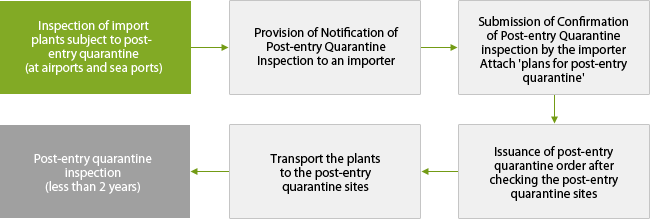Objective of post-entry quarantine inspection
The post-entry quarantine refers to inspection of some plants for planting or for propagation, where pests including virus that may be difficult to detect during the inspection at airports and seaports may lay dormant. In order to prevent spread of pests to other plants in Korea after the customs clearance, they are cultivated in isolation at the designated field sites where specific requirements have been met for a certain period and inspect whether pests are attached during the growth.
Plants subject to post-entry quarantine
- Bulbs of flowers
- Tubers of potato or tuberous roots of sweet potato
- Seedlings of Alpine strawberry, and seedling, cuttings and scions of rose tree
-
Seedlings, cuttings and scions of cherry trees and fruit trees
*"Seeds" of plants imported under import permit or imported for agricultural genetic resources
Plants exempted from post-entry quarantine

- Imported seeds which are not cultivated but are exported
- Seeds believed to have low risk of introduction of quarantine pests as a result of pest risk analysis, and designated by Director General of APQA
- Seeds agreed by the government of the exporting country not to undergo post-entry quarantine
- Seeds of flower bulbs, potato tubers, sweet potato tubers, and Alpine strawberry seedlings which have taken inspection at the growing fields by the government of the exporting country and described in the phytosanitary certificate that they meet the standards notified by Director General of APQA
- Imported bulbs of less than 100 in quantity which are not for sale
- Fruit trees for potting plants that have established tree forms of less than 10 weeks old or cherry tree seedlings that are not for sale
- Scions and cuttings of cut roses with leaves and Rosa excluding rose
- Seeds permitted to import which are intended for destruction after the experiment and research
- Alpine strawberry seedlings where leaves are kept whole
Post-entry quarantine sites
- Plants subject to post-entry quarantine shall be inspected at 2 national quarantine sites (located in Suwon, Gyeonggi-do and Gimhae, Gyeongnam) but because all imported volumes cannot be accommodated, only limited quantity are accepted at the national quarantine field sites and those that exceed the capacity shall be sent to designated field sites equipped with certain requirements for isolated cultivation.
- Plants subject to national quarantine field sites (Jungbu and Nambu Post-entry Quarantine Stations
- Flower bulbs: applicable to those whose import volumes are more than 3,000 ( 10kg) and 50 per inspection unit
- Seedlings and cuttings of Alpine strawberry and rose tree: 50 per inspection unit
- Potato tubers and sweet potato tubers: 10 kg per inspection unit
- Seedlings and cuttings of cherry trees and fruit trees: 50 per inspection unit
- Designated field sites of private farms
Those that exceed the capacity of national field sites and flower bulbs whose imported volume is less than 3,000 (10kg)
*Inspection unit is determined by the variety, or by growing field, grower or production areas of the exporting country.
Requirements for post-entry quarantine facilities
- The post-entry quarantine stations must be equipped with isolation facilities such as greenhouse, net screen house and vinyl house, and ventilation windows of the facilities shall be covered with a net screen of mesh size of no more than 1.6×1.6mm or less.
- Nevertheless, in case of flower bulbs, potato tubers, sweet potato tuberous roots, Alpine strawberry seedlings, and seedlings, cuttings and scions of rose trees, isolated cultivation can be conducted by inspection unit even if isolation facilities are not installed by dividing lands to ensure that no plants of same family come into contact. However, if pests are transmitted to nearby plants and result in treatment or destruction of plants due to lack of isolation facilities, the relevant cost will be borne by the owner of the seeds.
- When temporarily storing seeds before planting seeds subject to post-entry quarantine, one must select a storage where no pests can fly in, and obtain approval from a plant quarantine inspector in advance.
Post-entry quarantine period
In case of a herby plant such as bulbs, post-entry quarantine period shall be less than 1 generation; rose tree shall be until the first shipment, and seedlings of cherry tree and fruit trees as well as import prohibited plants that obtained import approval shall be within 2 years.
Penalties upon violation of post-entry quarantine orders
In case of a violation of post-entry quarantine orders, the person responsible shall be punished by a fine not exceeding 10 million won and by destruction of the whole volume of plants.



